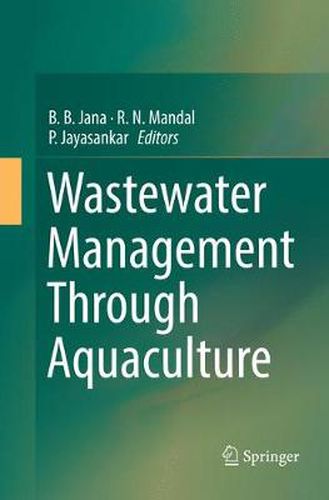Readings Newsletter
Become a Readings Member to make your shopping experience even easier.
Sign in or sign up for free!
You’re not far away from qualifying for FREE standard shipping within Australia
You’ve qualified for FREE standard shipping within Australia
The cart is loading…






This volume provides state-of-the-art information on soil-water interactions in wastewater systems, characterization of wastewater, modes of treatment, safety of wastewater use, water conservation technologies involved in recycling of sewage in fish culture, biogeochemical cycling bacteria and nutrient dynamics, ecosystem resilient driven wastewater reclamation, bioremediation, aquaponics, ecological integrity, culture practices of fish farming, microbial food web phenomena, fish diseases, environmental economics of wastewater, environmental risk assessment, environmental law and regulations. Given its breadth of coverage, the book will be useful to researchers, teachers, students, administrators, planners, farmers and entrepreneurs interested in the profitable use of wastewater in the wastes-into-wealth framework of for the benefit of humanity, and in achieving the targets for sanitation and safe wastewater reuse by 2030, specified in the United Nations’ Sustainable Development Goals.
Concerns are growing about the quality and quantity of fresh water, as severe crises are expected in the near future. Climate change has further worsened the strain on inland water resources, with its major impacts on ecosystems and human life. It is most urgent to protect and conserve inland water resources to maintain vital ecosystem functions. Despite the immense nutrient potentials of wastewater in terms of phosphorus, nitrogen and potassium and increasingly high rates of urbanization-based wastewater generation, wastewater has traditionally been overlooked as a resource. This produces a threefold loss - environmental degradation, monetary losses from fertilizers, and water. As a result, municipal wastewater offers a win-win strategy for water conservation and environmental protection, while also turning waste into wealth in the form of fish biomass and allied cash crops. Wastewater-fed aquaculture refers to a unique, integrated biosystem in which the wastes generated by the first system are used by the next subsystem. In wastewater-fed aquaculture biosystems, the organic wastes are recycled into fish biomass mediated through a complex microbial/autotrophic/heterotrophic food web mechanism.
$9.00 standard shipping within Australia
FREE standard shipping within Australia for orders over $100.00
Express & International shipping calculated at checkout
This volume provides state-of-the-art information on soil-water interactions in wastewater systems, characterization of wastewater, modes of treatment, safety of wastewater use, water conservation technologies involved in recycling of sewage in fish culture, biogeochemical cycling bacteria and nutrient dynamics, ecosystem resilient driven wastewater reclamation, bioremediation, aquaponics, ecological integrity, culture practices of fish farming, microbial food web phenomena, fish diseases, environmental economics of wastewater, environmental risk assessment, environmental law and regulations. Given its breadth of coverage, the book will be useful to researchers, teachers, students, administrators, planners, farmers and entrepreneurs interested in the profitable use of wastewater in the wastes-into-wealth framework of for the benefit of humanity, and in achieving the targets for sanitation and safe wastewater reuse by 2030, specified in the United Nations’ Sustainable Development Goals.
Concerns are growing about the quality and quantity of fresh water, as severe crises are expected in the near future. Climate change has further worsened the strain on inland water resources, with its major impacts on ecosystems and human life. It is most urgent to protect and conserve inland water resources to maintain vital ecosystem functions. Despite the immense nutrient potentials of wastewater in terms of phosphorus, nitrogen and potassium and increasingly high rates of urbanization-based wastewater generation, wastewater has traditionally been overlooked as a resource. This produces a threefold loss - environmental degradation, monetary losses from fertilizers, and water. As a result, municipal wastewater offers a win-win strategy for water conservation and environmental protection, while also turning waste into wealth in the form of fish biomass and allied cash crops. Wastewater-fed aquaculture refers to a unique, integrated biosystem in which the wastes generated by the first system are used by the next subsystem. In wastewater-fed aquaculture biosystems, the organic wastes are recycled into fish biomass mediated through a complex microbial/autotrophic/heterotrophic food web mechanism.